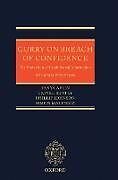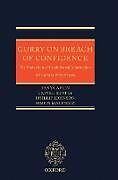Gurry on Breach of Confidence
Einband:
Fester Einband
EAN:
9780199297665
Untertitel:
The Protection of Confidential Information
Genre:
Sprach- und Literaturwissenschaften
Autor:
Tanya Aplin, Lionel Bently, Phillip Johnson, Simon Malynicz
Herausgeber:
Oxford Academic
Anzahl Seiten:
976
Erscheinungsdatum:
29.03.2012
ISBN:
978-0-19-929766-5
This is a new edition of Francis Gurry's renowned Breach of Confidence (1984), the first text to synthesise the then burgeoning case law on breach of confidence in systematic form. It is updated in light of the developments of the past two and a half decades and adds new material on the subject, thus regaining its status as the leading authority in the field.
This treatise is a timely and impressive contribution to the study of breach of confidence in all its varied manifestations. It should appeal to practitioners and academics alike, and surely deserves a wide readership.
Autorentext
Dr Tanya Aplin is a Reader in Intellectual Property Law at King's College, London. She was previously a Lecturer in Law at Robinson College, Cambridge (2000-2002), and a Research Fellow at Murdoch University (1997-1999). Dr Aplin is a visiting lecturer on law programmes offered by the IP Academy Singapore, National University of Singapore, Pepperdine University and Loyola Law School, Los Angeles. She is also Director of the King's Postgraduate Diploma/MA in UK, EC and US Copyright Law. She has written widely in the field of intellectual property law, including privacy. Professor Lionel Bently is Hershel Smith Professor of Intellectual Property Law and Director of the Centre for Intellectual Property and Information Law at the University of Cambridge. He is the author of a leading textbook on Intellectual Property, Intellectual Property Law (2nd ed. Oxford: OUP, 2004) Simon Malynicz is a barrister at 3 New Square , specializing in intellectual property law. He has experience of litigating breach of confidence actions in the UK. He has contributed to a number of works including, Intellectual Property in Europe (Sweet & Maxwell), The Community Trade Marks Handbook (Sweet & Maxwell) and The Community Designs Handbook (Sweet & Maxwell). He is also a joint author of the second edition of The Modern Law of Trade Marks (Butterworths). Phillip Johnson is a barrister specialising in intellectual property law, media law, entertainment and sports law. Formerly, he was a legal adviser to the Patent Office from 2003 to 2007. He is also a Visiting Senior Fellow at Queen Mary, University of London and a Visiting Professor at the Jersey Law Institute. He is presently the Chair of the Expert Advisory Group on Trade Marks and Designs for the Intellectual Property Office and a Chair of the Brands and Custom Research Group at the Intellectual Property Institute."
Zusammenfassung
Francis Gurry's renowned work, Breach of Confidence, published in 1984, was groundbreaking and invaluable in the field of intellectual property as the first text to synthesise the then burgeoning case law on breach of confidence into a systematic form. A highly regarded book, it was the first point of resort for practitioners and a key source for judges. Aplin, Bently, Johnson and Malynicz bring us a new edition of this important work, which remains faithful to the original in its approach, but is fully updated in light of the developments since the first edition. The authors expand upon the original work, in particular adding new material on the history and current relevance of the action for breach of confidence, . The authors stress both the advantages and disadvantages of the action for breach of confidence and, like Gurry, they constantly distinguish the action from associated legislative regimes which regulate the access to, acquisition, use and disclosure of information. The book extensively references the many analyses of the data protection regime and considers also issues of jurisdiction and choice of applicable law. Bringing together their particular skills and interests, the three authors produce a fresh re-writing of a highly significant text which retains the academic quality and precision of the original and stakes its claim once more as the leading authority in the field.
Inhalt
PART ONE: INTRODUCTION; I. The Legal Notion of Confidence; A. The Elements of Enforceable Confidence; B. The Functions Served by the Enforcement of Confidence; C. The Historical Development of the Action; D. Confidence and Its Relation to Other Systems of Regulation of Information; E. The Impact of the Human Rights Act; F. The Enduring Importance of the Action; PART TWO: THE JURISDICTIONAL BASIS OF THE ACTION; II. Specific Jurisdictional Sources; A. Introduction; B. Contract; C. Equity; D. Property; E. The Relevance of Tort; III. Sui Generis Action; PART THREE: CONFIDENTIAL INFORMATION; IV. The Attributes of Confidentiality; A. The Requirements of Confidentiality; B. Information, Expression, Ideas and their Embodiments (formerly Mode of Expression); C. Characteristics of Confidentiality; D. Information Lacking Confidentiality (formerly Compulsory Disclosure Under Statute); V. Categories of Confidential Information; A. Trade Secrets; B. Personal Confidences; C. Artistic and Literary Confidences; D. Government Secrets; PART FOUR: THE OBLIGATION OF CONFIDENCE; VI. General Principles; A. The Limited Purpose Test; B. Subjective or Objective?; C. Obviously Confidential Documents; D. Privacy Cases; E. Surreptitious Acquisition of Confidential Information - The Problem of Espionage (formerly in Part VII); F. Third Party Recipients; VII. Common Classes of Obligation; A. Business Obligation; B. Professional Obligations; C. Fiduciaries; D. Litigation; E. Obligations Arising from Disclosure Under Statute; VIII. The Employee's Obligations During His Employment; A. The Express Obligation of Confidence; B. The Implied Obligations; C. Limits to Express and Implied Obligations; D. Enforcement: Specific Issues Relating to Employees; IX. The Post-Employment Obligations of the Employee; A. Express Obligations; B. The Restraint of Trade Doctrines; C. Implied Obligations; D. Enforcement: Specific Issues Relating to Employees; X. Obligation Arising From Disclosure of Information Held by the State or Its agencies; A. Breach of Confidence; B. Statutory Prohibitions on Disclosure of Information Held by the State; C. Access to Information Held by the State; D. The European State and its Agencies; PART FIVE: DURATION AND BREACH OF OBLIGATION; XI. The Duration of the Obligation of Confidence; A. Release by Express or Implied Consent; B. The Mental Element in Breach; C. Partial Uses; D. Transformative Uses; E. Breach by Employees and ex-employees (formerly in Chapter XIII); PART SIX: DEFENCES; XIII. The Public Interest; A. The Defence of the Just Cause or Excuse; B. The Public Interest, Confidences and Litigation; C. The Legitimate Interest and Art 10 of the ECHR; XIV. Miscellaneous Defences; A. Unclean Hands; B. Delay; C. Disclosure Under Compulsion of Law; D. Disclosures Permitted Under Statute; PART SEVEN: REMEDIES; XV. The Available Remedies; XVI. Anton Piller Orders; XVII. Interlocutory Orders; A. The Standard of Proof; B. The Balance of Convenience; C. Section 12 of the Human Rights Act; D. The effect of the Civil Procedure rules; XVIII. Final Injunction; A. The Nature of the Information; B. The Publication Which The Information has received; C. Extent of Use; D. Good Faith and Change of Position; E. Detriment; F. Certainty in the Terms of the Injunction; G. Conclusion; XIX. Orders for Delivery Up or destruction; XX. Disgorgement Remedies (formerly Account of Profits); A. Circumstances in Which an Account is available; B. Calculating the Profit; C. Constructive Trusts; XXI. Compensatory Remedies (formerly Damages); A. Circumstances in Which Damages Will be Awarded; B. The Measure of Damages; XXII. Criminal Aspects; PART EIGHT: PROCEDURAL CONSIDERATIONS; XXIII. Procedures for Preserving Secrecy During Litigation; A. The Extent of Disclosure Required; B. Procedural Safeguards for Protecting Confidentiality; PART NINE: INTERNATIONAL ASPECTS; XXIV. Breach of Confidence in Public International Law Instruments; A. Paris Convention; B. TRIPs; XXV. Breach of Confidence in Private In…

Leider konnten wir für diesen Artikel keine Preise ermitteln ...
billigbuch.ch sucht jetzt für Sie die besten Angebote ...
Die aktuellen Verkaufspreise von 6 Onlineshops werden in Realtime abgefragt.
Sie können das gewünschte Produkt anschliessend direkt beim Anbieter Ihrer Wahl bestellen.
Loading...
Die aktuellen Verkaufspreise von 6 Onlineshops werden in Realtime abgefragt.
Sie können das gewünschte Produkt anschliessend direkt beim Anbieter Ihrer Wahl bestellen.
| # | Onlineshop | Preis CHF | Versand CHF | Total CHF | ||
|---|---|---|---|---|---|---|
| 1 | Seller | 0.00 | 0.00 | 0.00 |
